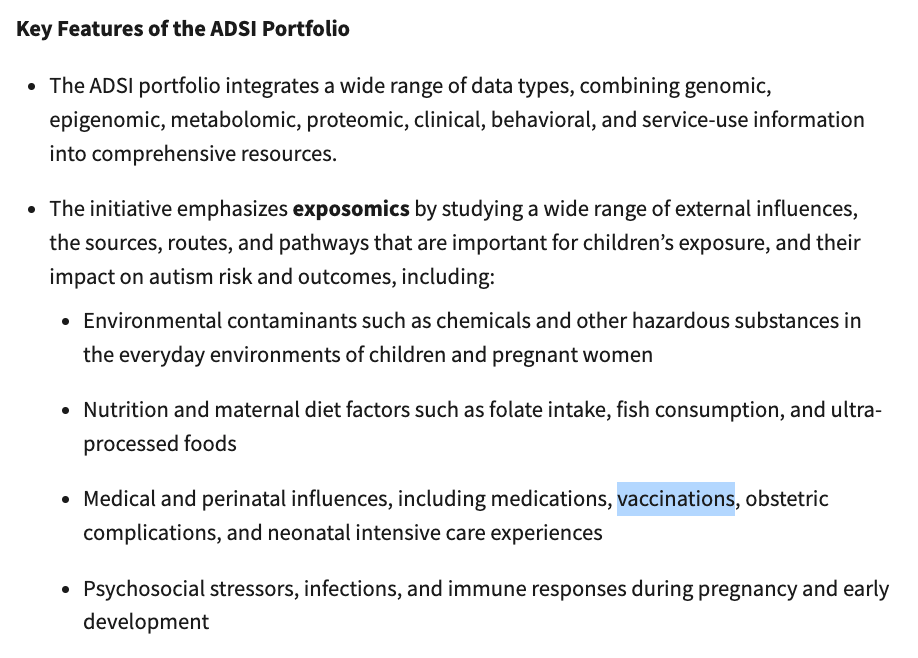This article originally appeared on Jon Fleetwood’s Substack and was republished with permission.
Guest post by Jon Fleetwood
Trump shares encounter with employee whose son was severely vaccine-injured, and condemns how children are "pumped" with 80 different vaccines so early in life.
As part of its new Autism Data Science Initiative (ADSI), the U.S. National Institutes of Health (NIH) will investigate whether medical exposures—including vaccines—are linked to the rising prevalence of autism spectrum disorder (ASD).
Reviews of 91 human studies up to 2016 show that approximately 74% of studies suggest mercury exposure—including through vaccines—as a risk factor or contributor to ASD, showing both direct and indirect effects on brain development.
The new announcement came during a White House press conference in the Roosevelt Room, where President Trump and HHS Secretary Robert F. Kennedy Jr. outlined what they described as “progress in uncovering the root causes of autism.”
The fact sheet released by HHS details three primary initiatives: a renewed look at leucovorin (folinic acid) as a treatment for autism-related symptoms, guidance to physicians on acetaminophen use in pregnancy, and the NIH’s launch of the Autism Data Science Initiative.
Although vaccines were not listed among the three headline goals, they were nevertheless singled out later in the announcement under the NIH initiative’s “medical and perinatal influences” heading.
Data from CDC VAERS show 2,682,925 adverse events linked to vaccines since 1990—yet, as the Harvard Pilgrim study commissioned by HHS confirmed, fewer than 1% of vaccine injuries are ever reported, meaning the true number is likely in the hundreds of millions.

NIH Autism Data Science Initiative
The new NIH initiative involves more than $50 million in new awards, funding 13 projects that will focus on autism prevalence, etiology, treatment, services, and replication studies.
According to HHS, the projects will use “large-scale, integrated data resources” spanning genetics, epigenetics, proteomics, metabolomics, and behavioral data.
A defining feature is the “exposomics” (the study of all environmental exposures over a lifetime and their impact on health) approach, which NIH says will comprehensively study environmental, medical, and lifestyle factors that may contribute to autism.
The list of exposures includes:
Environmental contaminants such as chemicals and other hazardous substances found in everyday life
Nutrition and maternal diet factors like folate intake, fish consumption, and ultra-processed foods
Medical and perinatal influences, explicitly naming medications and vaccinations alongside obstetric complications and neonatal intensive care exposures
Psychosocial stressors, infections, and immune responses during pregnancy and early development
By directly including vaccinations in its research portfolio, NIH is, for the first time, publicly committing to probe potential links between vaccines and autism within a large-scale government-backed initiative.

Autism Rates Continue to Climb
The announcement comes amid sobering new numbers from the CDC: 1 in 31 U.S. children born in 2014 has been diagnosed with autism—nearly a fivefold increase from when the CDC first began tracking autism rates in 2000.
The prevalence is higher among boys (1 in 20) and highest in California, where nearly 1 in 12.5 children are affected.
Trump & Kennedy Single Out Vaccines
During the announcement, Trump shared his encounter with an employee whose son was apparently severely injured by vaccines:
The U.S. president also encouraged parents to space out vaccinations in their children:
Secretary Kennedy also emphasized the new focus on vaccines, pointing out how 40 to 70% of mothers who have children with autism believe that a vaccine injured their child:
Bottom Line
While leucovorin therapy and acetaminophen exposure in pregnancy formed part of the HHS briefing, it is the NIH Autism Data Science Initiative that is likely to draw the most scrutiny.
For decades, the possibility of a vaccine-autism connection has been dismissed by government health agencies, and officials have repeatedly emphasized that “vaccines are safe and effective.”
The fact that NIH’s own research portfolio will now explicitly include vaccinations as one of the risk factors under study marks a major shift—and one that could carry significant implications for both public health policy and parental trust in government vaccine programs.
Copyright 2025 Jon Fleetwood


